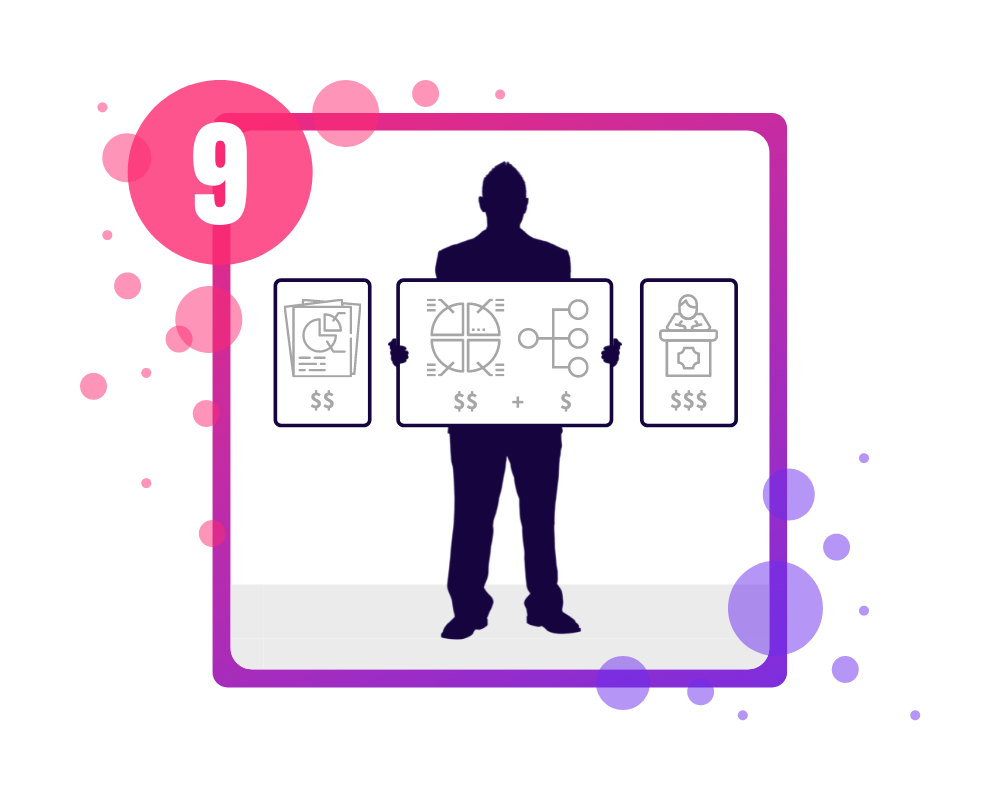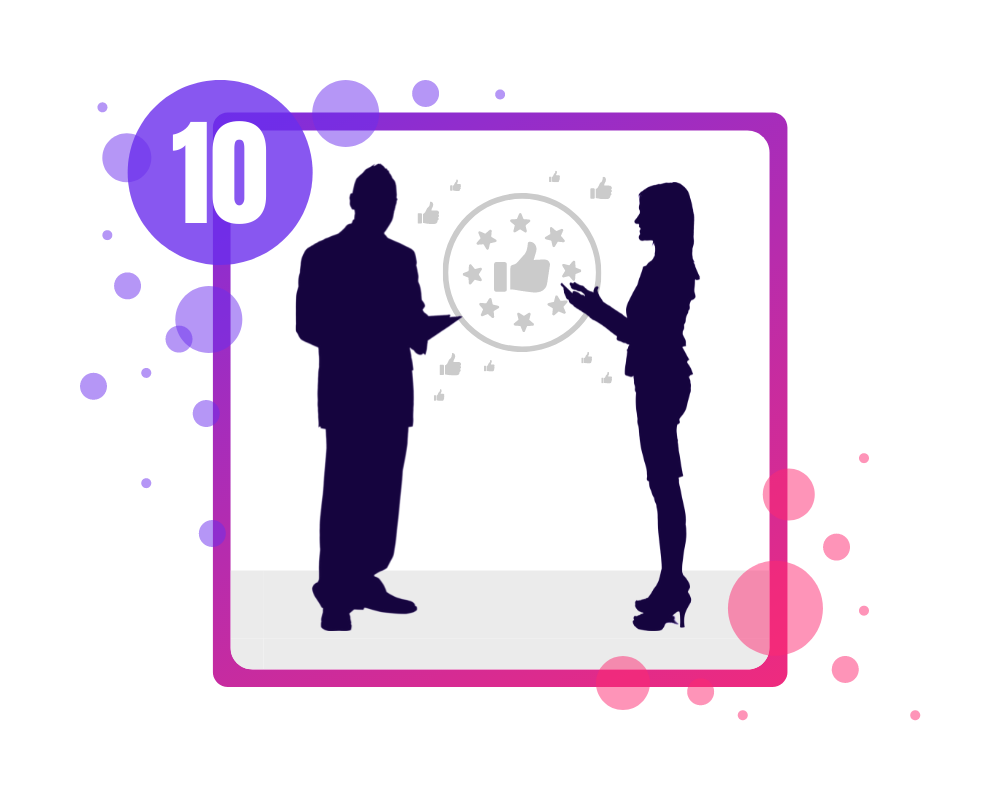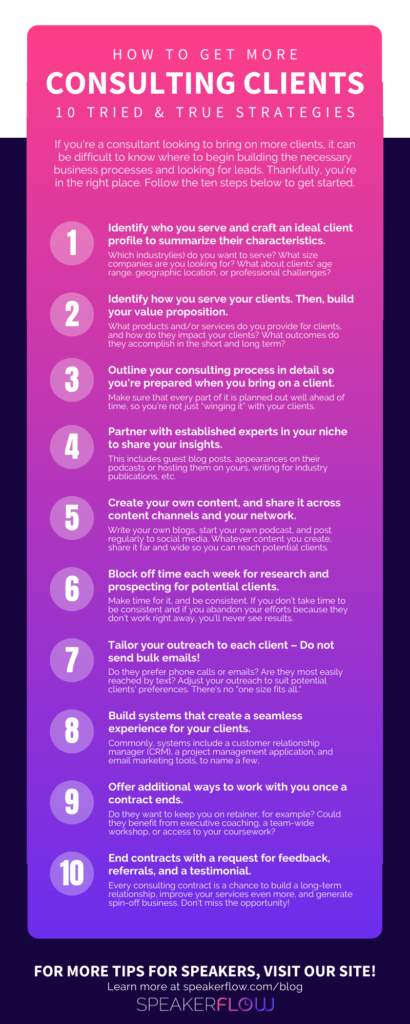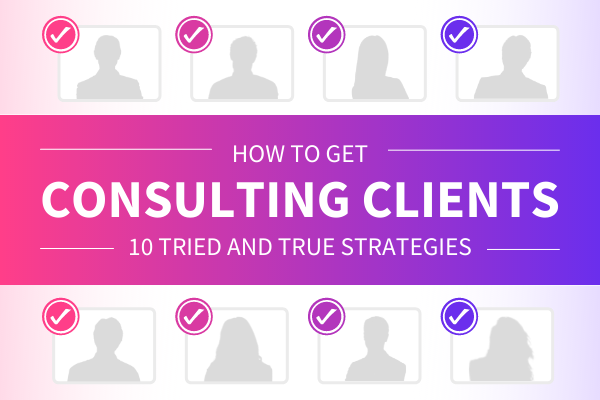As a consultant, your expertise sets you apart from the crowd. Any expert or thought leader can become a consultant, but that doesn’t mean this is an easy business. It relies on a well-developed network, strong business skills, and an understanding of your unique value proposition. If you want to know how to get consulting clients, you’re in the right place.
With more people trying to leverage their skills as thought leaders, there’s never been a better time to strike out on your own as a consultant. In fact, many professionals use consulting as a side business in addition to speaking, writing, and selling online courses. However, because consultants usually work on a contract basis, there’s a constant need to source clients and opportunities.
Unless you’re uber-successful and in-demand, consulting clients aren’t likely to appear overnight. Though there are endless types of consultants, you need to know how to put your skills to good use. It’s not enough to have a unique point of view. You need to also tap into existing demand to create a platform for yourself that converts to paying clients.
Most new consultants assume that networking is all it takes to succeed. While networking certainly has a strong place in the consulting world, who you already know can only get you so far. In this guide, we’ll explore how to get consulting clients through 10 tried and true strategies. While consulting is a profitable, exciting way to build your career, it’s in no way a get-rich-quick opportunity. Like all businesses, it takes hard work. Luckily, you’re in the right place 💪
- Identify who you serve and craft an ideal client profile.
- Identify how you serve and build your value proposition.
- Outline your consulting process in detail.
- Partner with established experts in your niche to share insights.
- Create your own content, and share it far and wide.
- Block off time each week for research and prospecting.
- Tailor your outreach to each client – No bulk emails!
- Build systems that create a seamless experience for your clients.
- Offer additional ways to work with you once a contract ends.
- End contracts with a request for feedback, referrals, and a testimonial.
Identify who you serve and craft an ideal client profile.
First, you can’t start selling your expertise until you know who you’re marketing to. If you want to get in front of the right audience, you need to know the type of individual or organization that is most likely to benefit from your services. The more specific, the better. The biggest mistake new consultants make is trying to be everything to everyone.

In reality, you’ll find more success if you narrow your niche. You might choose to serve clients locally, nationally, or globally, but you need to understand your specific audience. If you’re a sales consultant, for example, you might focus on individual sales managers. Conversely, you could exclusively market to startups trying to sell their product to investors. Do you see how your decision impacts how you create your strategy?
When you understand who you serve, you can craft an ideal client profile. This is a specific, detailed profile that defines aspects of your “ideal” client. You’ll be able to answer these questions with confidence:
- What motivates your audience
- Where is your audience located?
- What are your audiences’ biggest pain points?
- Will you support individual clients or organizations?
- What job title does your individual client have (if any)?
Identify how you serve and build your value proposition.
Second, you can’t begin to market yourself and get consulting clients until you know how to serve your audience. Keep in mind that there’s a difference between your value proposition and your promise statement. You should have both clearly defined. To clarify:

- Promise Statement: This is a snapshot of the benefits event organizers gain from hiring you. It also sums up your clients’ outcomes in a few words. This is a great statement to add to the top of your website’s homepage or in social media bios. It not only communicates how awesome you are, but it also justifies your consulting fees
- Value Proposition: Similarly, your value proposition also communicates the benefits of hiring you. However, it can be longer (and in full sentences), and it should also clearly communicate who you serve. Another way to think of this is how you set yourself apart from the competition.
It’s helpful to look at a few compelling examples when identifying your own promise statement and value proposition. Kindra Hall’s promise statement, for example, is “Capture Attention, Close Sales, Increase Influence Through The Art Of Strategic Storytelling.”
On the other hand, her value proposition is “Kindra Hall helps individuals and companies capture attention, close more sales and blow up their brands through the fine art of strategic storytelling. Each presentation is a meta-learning experience with powerful research, engaging storytelling, and actionable strategies for measurable results.” See how these both make it clear how clients benefit from her expertise?
Outline your consulting process in detail.
Next, your consulting process should also be crystal clear. There’s a bit of mystery around “consulting” and what it means in practice. This is because it takes so many different forms, and there’s no one-size-fits-all. Don’t assume clients know exactly what to expect when they work with you. Instead, spell it out clearly.

Better yet, when you have every part communicated and outlined in advance, you don’t run the risk of “winging it.” Still, it’s perfectly okay to adapt it as needed, but your clients are paying you to direct them because they assume you know what you’re doing. They deserve better than improvisation. Not only will you be more organized, but you’ll know exactly how to hit the ground running.
Most consultants go through a basic 4-step system and flesh things out from there. This includes assessing and discovering the client’s needs, planning recommendations based on the client’s goals, implementing this plan, and optimization. With this structure in mind, it’s easy to navigate each stage of the process with ease. Even an imperfect outline is better than no plan at all. It’s better to learn as you go than to make things up along the way.
Partner with established experts in your niche to share insights.
Additionally, you can’t carry the burden of getting consulting clients entirely on your own. Your network matters, and it expands your reach. If you’re only sharing content in your own circle, you’re missing out on a wider opportunity for thought leadership. Instead, partner with established experts to share insights within your niche.

Sharing is a part of any successful content marketing strategy, so this is a natural extension of your existing business practices. Better yet, you can easily leverage your products, services, and expertise when collaborating as a way to promote yourself. Of course, this should always be done in a natural, non-spammy way. Here are some ideas:
- Write guest blog posts about expert topics, linking back to your resources.
- Appear as a guest on relevant podcasts.
- Host well-known pros on your own podcast or social pages.
- Write guides for industry publications.
- Tag people and organizations in your social media posts.
- Cross-promote another expert in your email newsletter.
- Share insights in relevant Facebook or Reddit groups.
The more you can share your insights throughout the industry, the easier it becomes to be a trusted expert. Not only does collaborating increase your traffic and reach, but it builds real relationships.
Create your own content, and share it far and wide.
With collaboration in mind, create content that’s easy to share. While content is still king, it means little if it sits in a silent corner of cyberspace. Instead, you need to tap into the holy grail of social media and content: shares. While sharing other content is great, you should leverage your own perspective as a thought leader by building your own content.

Content comes in all shapes and sizes. From blog posts to podcasts and infographics, experiment with new ways to engage your audience. More importantly, learn from existing content to see what attracts the most attention and resources. At the heart of every content piece is value. As a consultant, you specialize in providing unique value. If you can demonstrate this value through your content, you “show” rather than “tell” why you’re worth hiring.
Sharing doesn’t have to be complicated. Sometimes it’s as simple as asking your audience to share or providing something in exchange for a share. Content marketing has the potential to bring in up to 3x as many leads as traditional marketing. Considering that it costs 62% less, this is a smart move for any budding business.
Block off time each week for research and prospecting.
Next, if you don’t have a clear schedule, you might find yourself getting stuck “in the weeds.” This happens to the best of us, and it’s a learning experience. Instead of letting the clock control you, block off a specific time every week for research and prospecting. If you don’t make time for it, and if you’re not consistent, you won’t see progress.

In all honesty, you probably won’t see success right away. This is completely normal and expected. There are few overnight successes in the consulting space. If you decide that research and prospecting is a bust based on your first handful of attempts, you’ll never see any results. One of our founders says it best, “The key is to plan, execute, and test, in that order and repeatedly.”
Believe it or not, a reported 82% of people don’t have any dedicated time management system. By keeping track of the time you’ll put into research and prospecting, you avoid that dreaded feeling of overwhelm. While you don’t want to dedicate too much time to prospecting, it should be built into your weekly routine. Over time, learning and optimizing come naturally.
[hubspot type=cta portal=5815852 id=e68abcd9-8ad0-4673-81d2-450b59a97afc]
Tailor your outreach to each client – No bulk emails!
Nevertheless, though prospecting is important, it shouldn’t be done in bulk. While it’s understood by now that personalization is important, many professionals still worry that they don’t have enough time to research and customize each interaction. This leads to the dreaded copy-paste, one-size-fits-all bulk emails.

Though it might sound like a smart way to save time, these bulk emails go straight into the inbox abyss the majority of time. While you don’t need to completely re-do each outreach, you do need to be mindful of capturing what’s most likely to appeal to your individual prospect. Here’s how to get it right:
- Method: Use the outreach method (email, phone, text, social media) that’s the best fit for your client.
- Persona: Personalize the persona of each message, using things like position, company size, and more to cater to individual needs.
- Value: Don’t focus on yourself. Focus on the specific value you bring to individual clients.
- Follow-up: If at first you don’t succeed, try again. If you spend only a minute on your first outbound communication, spend even more time on the follow-up.
Build systems that create a seamless experience for your clients.
Not only should you create a personalized experience, but it should also be seamless. This means communication is easy and reliable, and all aspects of your business work together. Another word for this is to create an omnichannel experience. The goal is always to reduce the friction between each stage of the client’s journey.

If you want to get consulting clients, your entire ecosystem should be seamless. From initial prospect signatures to project management, the flow between apps needs to be as simple as possible. We can all relate to the frustration of skipping between apps, running into roadblocks, and having calendar issues. This could lead clients to think you’re not professional.
What’s the best way to avoid this? It starts with your foundational planning. By building an omnichannel experience from the start, it’s easier to move your clients along the sales journey each step of the way. As the saying goes, work smarter not harder.
Offer additional ways to work with you once a contract ends.
Along with a seamless experience, don’t make the mistake of thinking the work ends with the final deadline. You can always offer additional ways to work with your clients once a contract ends. They might wish to keep you on retainer, for example. Maybe they’d benefit from executive coaching, a workshop, or your online course.

This is a prime opportunity to upsell your other business ventures. Since your client already knows and trusts your expertise, they’re more likely to work with you again. Keeping customers loyal will result in greater revenue than constantly prospecting new leads—plus this saves you a lot of work.
At the very least, continue these relationships with clients into the future. Even if they’re not ready to work with you right away, this could change in the future. Whether you offer professional speaking, digital content, or ongoing training opportunities, your goal is to earn a loyal client for life.
End contracts with a request for feedback, referrals, and a testimonial.
Finally, end each contract with a request for feedback, referrals, and a testimonial. Feedback is the only way to grow your practice, learning what you can do better each step of the way. No professional is perfect. It doesn’t matter if you’re just getting started or you have over a decade of experience. Feedback is how you grow, and you should feel empowered to ask how you did.

Additionally, referrals and testimonials are powerful marketing tools. Many clients don’t want to take you just at your word. They want to hear from your past clients just what value you have to offer. More importantly, your engaged clients can refer you to others who might also be a great fit. Who wouldn’t want their loyal customers to handle their marketing for them?
Ultimately, one client can turn to dozens if you’re smart and strategic about how you get consulting clients. These tried and true strategies above were created with experts in mind, but they work with people at all stages of business creation. In today’s digital world, now is the perfect time to strike out on your own as a consultant.
As a professional consultant, you’re so much more than an expert. You’re a salesperson, marketer, and advocate for your experience. When you combine all of these things, you create an unstoppable force in the business world.






